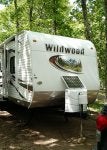I own a 2004 Tundra TRD sr5 access cab with the towing package. I am new to the camping world, as a matter of fact, we just bought our first camper last night, a 2009 r-pod r-175. I am trying to do some reading and figure out if I will need a generator or not. We will probably be doing 2 night camping trips, with the longest being a 4-5 day hunting trip this fall. We only have one battery right now, but I would like to purchase another one. My question is, will I just be able to hook my camper up to the truck and let it run for a while to bring the battery charge back up, or is my truck not equipped with the right equipment to do this. Thanks.

Wyo_Tundra
Will my truck charge my camper battery?
Wyo_Tundra
Discussion starter
6 posts
·
Joined 2015
- Add to quote
I own a 2004 Tundra TRD sr5 access cab with the towing package. I am new to the camping world, as a matter of fact, we just bought our first camper last night, a 2009 r-pod r-175. I am trying to do some reading and figure out if I will need a generator or not. We will probably be doing 2 night camping trips, with the longest being a 4-5 day hunting trip this fall. We only have one battery right now, but I would like to purchase another one. My question is, will I just be able to hook my camper up to the truck and let it run for a while to bring the battery charge back up, or is my truck not equipped with the right equipment to do this. Thanks.
7,042 posts
·
Joined 2007
You would have to take a multi-meter back to the trailer connection on your truck and test all the pins in the 7 pin plug. I'm not sure if any of them supply auxiliary power anymore or if that's something that has to be hooked up. I know in my Ranger and my F-250 it was setup to trickle charge the trailer batteries it was very slow doing it though so I wouldn't count on that as a sole means of charging your trailer batteries, its not setup to charge them from a discharged state only to really just maintain them as you are driving.
Wyo_Tundra
Discussion starter
6 posts
·
Joined 2015
Ok, everything I have read says basically the same thing. I was just hoping to avoid spending an extra few hundred dollars right now. Thanks.
Sent from my iPhone using Tapatalk
Sent from my iPhone using Tapatalk
11,775 posts
·
Joined 2012
The connector will trickle charge it and take forever but you can hook jumper cables to the truck and camper for a faster charge
7,042 posts
·
Joined 2007
You might look into a solar panel to place on the top of your trailer to help maintain the trailer batteries, that may be a much faster charge rate than the trickle charge it receives from the tow vehicle.
11,775 posts
·
Joined 2012
Also, you are better off running two 6 volt golf cart batteries as they last forever. Lighting will sap your batteries quickly do led lights are a great upgrade, at least for the lights you use most, Amazon I'd usually the cheapest for those. I use an 80 watt solar panel on longer trips to keep batteries going, works great
6,883 posts
·
Joined 2008
Yep this worked great for me as well. The LED lights worked great. I also used a small 75 watt panel. I use to use alligator clips from the solar panel directly to my 2 12v batteries . I did not even have to use a charge controller.
Wyo_Tundra
Discussion starter
6 posts
·
Joined 2015
I looked in to solar panels and it looked like a generator was going to be cheaper. Also, I camp in the mountains where there is not a lot of sun light that penetrates the trees. I am worried that I would need to buy several panels in order to get a sufficient charge. I am looking for the least expensive method, and everything I have seen with panels is close to 1,000 total.
Sent from my iPhone using Tapatalk
Sent from my iPhone using Tapatalk
11,775 posts
·
Joined 2012
You don't need fancy mounted panels,I built mine for $200 and have a 50ft lead on it so I can move it as the sun moves. You only need a generator for things like AC, hair dryer, etc. Otherwise, wire up a small inverter for things like TV, charging phones, etc.
11,775 posts
·
Joined 2012
The battery you get with a new camper is usually like a 23 which sucks, I charge my 23 and put it inside the camper for aux power for the Tv & charging phones then use two Interstate golf cart batteries from Costco for the camper. Even without the solar panel those batteries would prob last 5-6 days easy.
Wyo_Tundra
Discussion starter
6 posts
·
Joined 2015
I think a small generator might be the thing I need to just charge batteries. From what I have read, my camper has a three stage charger built in, so all I would need to do is plug my 30 amp cord in to the charger and let it go for a couple of hours to get the batteries back up. We don't actually have the camper yet, but a mechanic from the dealer will be calling me tomorrow, so I can find out what I have for a battery. If you really can get that much life out of 2 golf cart batteries, I might go that way. I don't plan on using electricity all that much, and will only run ac if we are plugged in at a camp sight. LED lighting is already in the plan. Sorry if I seem dumb about this stuff, but all this electricity stuff is confusing. I need a class to attend or something, haha
Sent from my iPhone using Tapatalk
Sent from my iPhone using Tapatalk
7,042 posts
·
Joined 2007
The lights, heater, refrigerator, stove, and your water pump will all work on the trailer batteries. The AC won't run unless the trailer is plugged into a 110V outlet or in your case a generator. The trailer doesn't have an inverter in the way one thinks of an inverter. The trailer's inverter just converts the 110V AC incoming power to 12V for use in the trailer when the trailer is plugged in, it also has a built in battery charger. Other than that the trailer doesn't really have any means of running any 110V stuff without being plugged into an outlet or into a generator. Even then you will need a generator that can handle the power requirements of an AC. You'll also want to try and find a generator that is relatively quiet or you'll annoy yourself as well as your neighbors LOL.
194 posts
·
Joined 2009
The primary purpose of a Converter in an RV is to change 120 Volt A/C power to 12 Volt D/C power whereas the purpose of an Inverter is to change 12 Volt D/C power to 120 Volt A/C power.
49 posts
·
Joined 2014
We just got back from Big Meadows in Shenandoah with my 26ft travel trailer. Water is available, but no electricity. We easily survived 4 days on a single group 24 battery and 50 watt solar panel. The solar panel actually didn't do much though since it rained a lot while we were there. The water pump drew the most power, but even then I still had 70% remaining when we left the park. I had already converted all my bulbs to LED which helped immensely.
In the future, I think having a couple different power generating solutions is best. I recommend either a 100w solar panel or a portable wind turbine, and a small gas generator. The alternative solutions help reduce the amount of time you will need to run the generator (and create noise pollution). If you have no sun (or wind) then at least the generator offers guaranteed source of charging your batteries. Be sure to buy a campground-grade generator (meaning 60db or less).
If you are planning on boondocking a week or more, definitely consider two batteries. Two 6v 210Ah golf car batteries is ideally the way to go.
In the future, I think having a couple different power generating solutions is best. I recommend either a 100w solar panel or a portable wind turbine, and a small gas generator. The alternative solutions help reduce the amount of time you will need to run the generator (and create noise pollution). If you have no sun (or wind) then at least the generator offers guaranteed source of charging your batteries. Be sure to buy a campground-grade generator (meaning 60db or less).
If you are planning on boondocking a week or more, definitely consider two batteries. Two 6v 210Ah golf car batteries is ideally the way to go.
Attachments
-
111.4 KB Views: 178
5 posts
·
Joined 2020
I am a new rver and I don't know how to charge RV battery from a vehicle. I already know that my car’s battery is constantly recharged by the engine’s alternator but the question is, is there a way for my home batteries to charge while I am driving?
5 posts
·
Joined 2020
I have found some information to answer my question. But I don't know is that right? Can you give me some advices? Thanks. Some information that I found: How to Charge RV Battery from Vehicle?
2 posts
·
Joined 2021
Charging your RV batteries properly is the greatest way to ensure that they will survive for many more camping trips. Purchase a high-quality charger that is tailored to the size and capacity of your RV batteries. This may require some investment, but it will be worthwhile because you will save money on batteries.
Keep in mind that various chargers are required for flooded and sealed vehicle batteries. Before you go looking for a charger, you should do some study on your RV batteries and their specific requirements.
Keep in mind that various chargers are required for flooded and sealed vehicle batteries. Before you go looking for a charger, you should do some study on your RV batteries and their specific requirements.
-
?
-
?
-
?
-
?
-
?
-
?
-
?
-
?
-
?
-
?
-
?
-
?
-
?
-
?
-
?
-
?
-
?
-
?
-
?
-
?
- posts
- 2.2M
- members
- 166K
- Since
- 2007
TundraTalk.net forum offers the most comprehensive collection of Toyota Tundra information. Find discussions on the Toyota Tundra Diesel, TRD Pro, SR5, lift kits, towing capacity, classifieds, and more!
Top Contributors this Month
View All
MetalMonkey
527 Replies
Bleach
348 Replies
24hrsparkey
11 Replies




